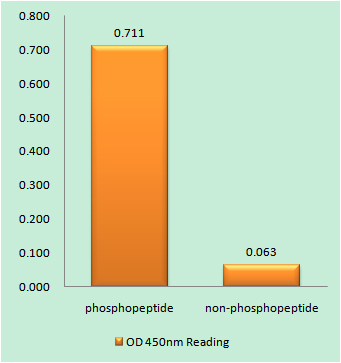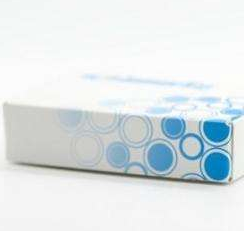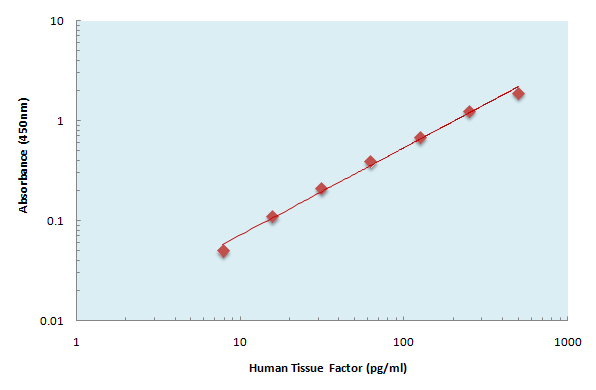TF Polyclonal Antibody
- Catalog No.:YT5194
- Applications:WB;IHC;IF;ELISA
- Reactivity:Human;Rat;Mouse;
- Target:
- TF
- Fields:
- >>Complement and coagulation cascades;>>AGE-RAGE signaling pathway in diabetic complications
- Gene Name:
- F3
- Protein Name:
- Tissue factor
- Human Gene Id:
- 2152
- Human Swiss Prot No:
- P13726
- Mouse Swiss Prot No:
- P20352
- Immunogen:
- The antiserum was produced against synthesized peptide derived from the Internal region of human F3. AA range:131-180
- Specificity:
- TF Polyclonal Antibody detects endogenous levels of TF protein.
- Formulation:
- Liquid in PBS containing 50% glycerol, 0.5% BSA and 0.02% sodium azide.
- Source:
- Polyclonal, Rabbit,IgG
- Dilution:
- WB 1:500 - 1:2000. IHC: 1:100-300 ELISA: 1:20000.. IF 1:50-200
- Purification:
- The antibody was affinity-purified from rabbit antiserum by affinity-chromatography using epitope-specific immunogen.
- Concentration:
- 1 mg/ml
- Storage Stability:
- -15°C to -25°C/1 year(Do not lower than -25°C)
- Other Name:
- F3;Tissue factor;TF;Coagulation factor III;Thromboplastin;CD142
- Observed Band(KD):
- 33kD
- Background:
- This gene encodes coagulation factor III which is a cell surface glycoprotein. This factor enables cells to initiate the blood coagulation cascades, and it functions as the high-affinity receptor for the coagulation factor VII. The resulting complex provides a catalytic event that is responsible for initiation of the coagulation protease cascades by specific limited proteolysis. Unlike the other cofactors of these protease cascades, which circulate as nonfunctional precursors, this factor is a potent initiator that is fully functional when expressed on cell surfaces. There are 3 distinct domains of this factor: extracellular, transmembrane, and cytoplasmic. This protein is the only one in the coagulation pathway for which a congenital deficiency has not been described. Alternate splicing results in multiple transcript variants.[provided by RefSeq, May 2010],
- Function:
- function:Initiates blood coagulation by forming a complex with circulating factor VII or VIIa. The [TF:VIIa] complex activates factors IX or X by specific limited protolysis. TF plays a role in normal hemostasis by initiating the cell-surface assembly and propagation of the coagulation protease cascade.,induction:TF expression is highly dependent upon cell type. TF can also be induced by the inflammatory mediators interleukin 1 and TNF, as well as by endotoxin, to appear on monocytes and vascular endothelial cells as a component of cellular immune response.,online information:The Singapore human mutation and polymorphism database,online information:Tissue factor entry,similarity:Belongs to the tissue factor family.,
- Subcellular Location:
- [Isoform 1]: Membrane ; Single-pass type I membrane protein .; [Isoform 2]: Secreted .
- Expression:
- Lung, placenta and pancreas.
Transcranial direct current stimulation promotes angiogenesis and improves neurological function via the OXA-TF-AKT/ERK signaling pathway in traumatic brain injury Aging-US Bingkai Ren WB Rat 1:1000 brain tissue
- June 19-2018
- WESTERN IMMUNOBLOTTING PROTOCOL
- June 19-2018
- IMMUNOHISTOCHEMISTRY-PARAFFIN PROTOCOL
- June 19-2018
- IMMUNOFLUORESCENCE PROTOCOL
- September 08-2020
- FLOW-CYTOMEYRT-PROTOCOL
- May 20-2022
- Cell-Based ELISA│解您多样本WB检测之困扰
- July 13-2018
- CELL-BASED-ELISA-PROTOCOL-FOR-ACETYL-PROTEIN
- July 13-2018
- CELL-BASED-ELISA-PROTOCOL-FOR-PHOSPHO-PROTEIN
- July 13-2018
- Antibody-FAQs
- Products Images
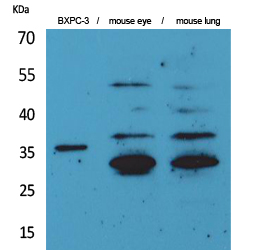
- Western Blot analysis of BXPC-3, mouse eye, mouse lung cells using TF Polyclonal Antibody. Secondary antibody(catalog#:RS0002) was diluted at 1:20000
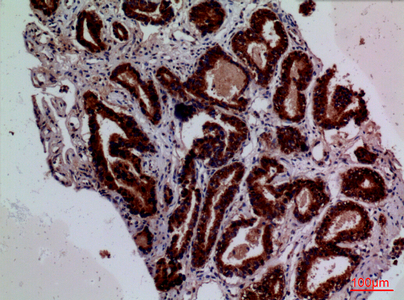
- Immunohistochemical analysis of paraffin-embedded human-prostate-cancer, antibody was diluted at 1:100

- Western blot analysis of lysate from BXPC-3 cells, using F3 Antibody.
